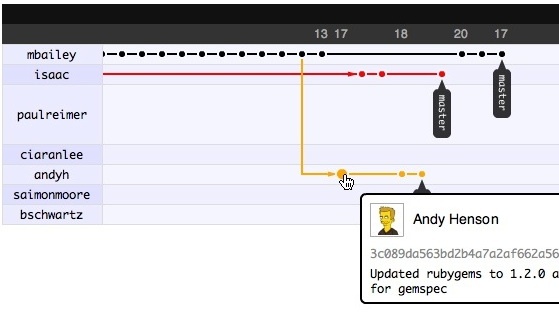cherry picking git commits
I've been a little bit slow to learn git. I put that down to it being my fourth version control system (after rcs, cvs and svn). Like a fourth child[1] it brought with it less novelty and I've got less free time to get to know it. That being said, git is a revolutionary advance over subversion and is worth committing the effort to learn.
A little while ago I imported my deployment library 'deprec' to github. This week I discovered a feature that shows me what changes other open source developers have been making on their forks of the deprec codebase.
Clicking on that link shows us a diff for that commit and today Pete Yandell was kind enough to show me how to cherry pick a commit and apply it to my repository.
#First we create a branch and pull thewoolleyman's code into it
git checkout -b thewoolleyman
git remote add thewoolleyman git://github.com/thewoolleyman/deprec.git
git pull thewoolleyman master
# Next we find a commit that interests us
# I chose 09dca130c2826339f3cacff937acee4ef26c6d6c
git log
# Compare this changeset with the previous version
# Note that you can use github for this and the previous step.
diff 09dca130c2826339f3cacff937acee4ef26c6d6c 09dca130c2826339f3cacff937acee4ef26c6d6c^
# Change back to our master branch
git checkout master
git cherry-pick 09dca130c2826339f3cacff937acee4ef26c6d6c
# Push the changes to our remote repo (in this case - github)
git push
I'm pretty excited at how simple it is to see what other people have done with my code and merge it into deprec. Github have provided a feature that I think will really aid in the development of open source. Well done guys!
[1] I don't have kids (yet) but if and when I do I hope they realize this was said in jest!
